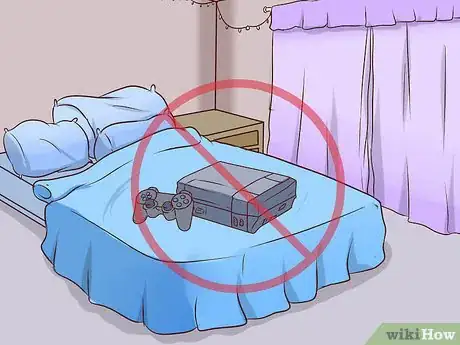This article was co-authored by wikiHow staff writer, Amber Crain. Amber Crain has been a member of wikiHow’s writing staff for the last six years. She graduated from the University of Houston where she majored in Classical Studies and minored in Painting. Before coming to wikiHow, she worked in a variety of industries including marketing, education, and music journalism. She's been a radio DJ for 10+ years and currently DJs a biweekly music program on the award-winning internet radio station DKFM. Her work at wikiHow supports her lifelong passion for learning and her belief that knowledge belongs to anyone who desires to seek it.
This article has been viewed 257,945 times.
Learn more...
Are you tired of family members barging into your room unannounced and going through your things when you’re out? Most young people deal with this issue at some point and it can be very frustrating. Luckily, there’s a variety of different options you can try out to prevent it from continuing!
Steps
Communicating Directly with Your Family
-
1Explain your feelings in a calm and respectful way. This is the best way to talk to your family about privacy. Ask them nicely to respect your space and privacy, just as you respect theirs. Do this without pleading, whining, getting upset or acting victimized. Be firm, to the point and respectful throughout the entire conversation.
- You can say things like, "I don't feel like I have any personal space or privacy in my bedroom. Can we talk about that? It's upsetting me."
- Or you could try to put a knocking policy into place. Start the conversation with something like, "I want to start a new rule in the house about knocking before entering. Can we have a family meeting about that?"
- You could also say, "I respect your privacy and knock on your door. I want you to do the same thing for me."
-
2Post a warning sign on your bedroom door. A simple sheet of paper will suffice as a door sign. Keep your message simple and write it legibly. “Please knock before entering” and “Please don’t enter without my permission” would both work great.
- If it’s a younger sibling you’re having trouble with, be sure to post the sign at eye level for them.
- If the sibling is too young to read, draw a picture of a person knocking on a door.
- You could also hang a dry-erase marker board on your door so that you can change the message sometimes and even address specific family members in the message.
Advertisement -
3Be assertive and confront them. Sometimes being polite just won't work, especially on younger siblings. If you've already spoken to your family about respecting your privacy with no results, raise your voice at them the next time it happens. There is no reason to get violent or be mean, but it's okay to raise your voice to show that you're angry.
- Avoid saying things in the heat of the moment that you'll regret later.
- Be perfectly honest about why you're angry. Say things like, "We talked about this, why won't you listen to me?" and "I am really upset with you right now."
- Sometimes yelling a good old-fashioned "Get out!" and pointing at the door can be effective, especially with a much younger sibling. Keep in mind that this might hurt their feelings, though.
- If someone barges in while you're in your room, stand up immediately to confront them. Walk toward them to keep them from coming in any further and assertively ask them to leave.
-
4Get your parents involved. When you're dealing with an intrusive sibling who won't listen and it's becoming a real problem, go to your parents privately to ask for their assistance. Explain in a calm way that you're really upset about this, and that you deserve privacy. Ask them to intervene on your behalf.
- Make it clear to your sibling that when they barge in your room, you are going to go tell your parents immediately. You could give them a warning and say, "The next time this happens, you're going to get in trouble with mom and dad."
- As soon as they come in say, "I'm going to tell mom and dad about this right now."
- Get up immediately and go get one or both of your parents. Confront your sibling in front of your parents and ask them to back you up.
- Once you've got your parents there, say something along the lines of, "This can't happen anymore. I deserve personal space and I want us to resolve this issue right now."
Removing Reasons for Them to Come In Your Room
-
1Avoid keeping things the whole family uses in your room. For example, if you've got the only game console or tablet in the house, do not keep them in your room. If you do, your family members will come in to retrieve them.
- Keep things that everyone uses in a common room of the house, such as the living room, game room or basement.
- If necessary, create a schedule of use and give everyone an equal allotment of time to use the item.
-
2Do your own chores. This is a respectful thing to do, and if you take care of all of your own chores, no one has any reason to come into your room without your permission. Make your bed every day, pick up your clothes and launder them yourself, keep your room clean and return any dirty dishes to the kitchen without being asked.
- Be sure to let your family members know that you've already taken care of the chores in your room. That way they can't say they came in to check.
- Bring a parent in your room to inspect your handiwork, if necessary.
- If you don’t take care of these things yourself, family members (especially your parents) will be forced to come in and take care of these things themselves.
-
3Show mutual respect. If you want your wishes to be respected, you have to show that same respect toward your family members. Never barge into their rooms unannounced. Always knock on their bedroom doors and wait until they ask you to come in before opening their door.
- Even if your family members haven’t started respecting your privacy yet, start respecting theirs.
- Set an example by treating everyone in the house the exact same way that you want to be treated.
Preventing Entry Into Your Room
-
1Get a lock for your bedroom door. There are several ways to approach this. The easiest way is to get a portable door lock that can be easily installed and removed by you (no tools required). Addalock is one of the most famous brands.[1] You could also get a brand new door knob that locks with a key at a hardware store and install it yourself (or ask a family member to help).
- Another option is to get a chain lock at a hardware store and install that yourself (or ask for help).
- If your parents are reluctant to allow you to lock your door, explain to them exactly why you feel that your privacy is being violated.
-
2Barricade your door. If you’re in your room and you want privacy, barricade your door by wedging a chair under the door knob or pushing a piece of furniture in front of it. This is only helpful if you’re actually in your room when someone tries to barge in, but it will prevent them from being able to do it.
- Make sure that you can quickly and easily remove whatever you’re barricading your door with, if necessary, in the event of an emergency.
-
3Use a doorstop to hold the door closed.[2] Doorstops are wedge-shaped tools that can be used to hold a door open or closed. Block family members from opening the door by shoving a doorstop under your door when you're in your bedroom. If you don't have a doorstop, you can easily improvise one. Use anything that will fit tightly in the space between the bottom of your door and the floor.
- The more things you wedge tightly under the door, the stronger the barricade is, so if you're concerned it won't hold, use multiple items.
- Grab a pair of old sneakers and shove the toe end of both of them under your door. Space them out a little for a stronger hold.
- Shove a big fluffy towel under your door. Really cram it under there so that it will hold, or use multiple towels.
Hanging Out with Them Outside of Your Room
-
1Work on a project together. Sometimes siblings just want a little attention from you. Come up with a project that you can work on together outside of your bedroom. If you're dealing with a very small sibling, come up with a fun art project you can work on together.
- If it's someone a little older, ask for their help on something, like going shopping with you to get a parent a birthday gift or even making something creative together as the gift.
- Giving a family member a little attention outside of your bedroom will hopefully make them less inclined to barge in your room constantly for attention.
-
2Make a "date" to watch a movie together in another room. Show them that you want to hang out with them, just not in your bedroom. Let them pick out the movie, pop some popcorn and spend a little quality time together.
- Be sure that you do this outside of your bedroom. You need to get them in the habit of hanging out with you elsewhere.
-
3Play games or hang out with them in their room. Pull out some board games or just hang out with them in their bedroom to reinforce the idea that hanging out with you does not mean barging into your room.
- Before you go into their bedroom, knock and wait to be let in.
- Hopefully this will set an example of the kind of behavior you want from them.
Community Q&A
-
QuestionHow can you block the door so they can't get in your room while you're in there?
 Community AnswerIf you’re in your room and you want privacy, barricade your door by wedging a chair under the door knob or pushing a piece of furniture in front of it. Just make sure that you can quickly and easily remove whatever you’re barricading your door with, if necessary, in the event of an emergency.
Community AnswerIf you’re in your room and you want privacy, barricade your door by wedging a chair under the door knob or pushing a piece of furniture in front of it. Just make sure that you can quickly and easily remove whatever you’re barricading your door with, if necessary, in the event of an emergency. -
QuestionMy niece and nephew hijacked my room and I can't even get in there myself - what do I do?
 Community AnswerKnock and raise your voice so they can hear you when you tell them to get it out. If they ignore you, threaten to tell one of your parents. If they continue to ignore you, go get a parent - yours or theirs - to help you handle the situation.
Community AnswerKnock and raise your voice so they can hear you when you tell them to get it out. If they ignore you, threaten to tell one of your parents. If they continue to ignore you, go get a parent - yours or theirs - to help you handle the situation. -
QuestionHow do I keep my cousins out of my room?
 Community AnswerTell them firmly that you don't want them in your room, especially if you aren't in there. Try to hang out with them a little outside of your room, in case all they want is your attention. When they barge in, march them out immediately and do something with them in another room. If they won't stop, get your parents and/or their parents involved.
Community AnswerTell them firmly that you don't want them in your room, especially if you aren't in there. Try to hang out with them a little outside of your room, in case all they want is your attention. When they barge in, march them out immediately and do something with them in another room. If they won't stop, get your parents and/or their parents involved.
References
About This Article
It can be annoying when your family members come in your room without asking, but there are a few ways you can help keep them out. Try calmly explaining to your family that you don’t want them to go in your room. For example, say something like, “I like having my own private space. Can you please not go in my room without my permission?” If your brother or sister comes in, ask your parents to tell them not to, since they’ll probably listen to them more. You can also write a sign saying, “Please don’t come in without my permission.” As a last resort, block your door from the inside with a door stop or chair so they can't just walk in. For more tips, including how to get your family to knock before coming in your room, read on!






































































